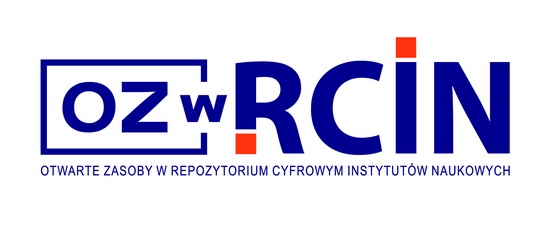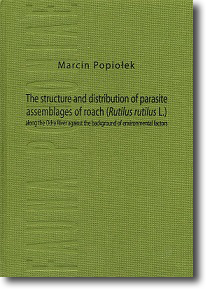Catalogus Faunae Poloniae - New series - vol. 3 Plant bugs of Poland. Part II. Subfamily Mirinae
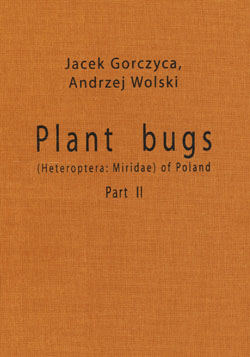
Jacek Gorczyca, Andrzej Wolski
Warszawa 2011
Katalog fauny Polski - Nowa seria - vol. 3 - Plant bugs of Poland. Part II. Subfamily Mirinae
ISBN 978-83-930773-3-5 ISSN 1895-5614
Wydawca:
Natura optima dux Foundation
Cena: 63 zł + przesyłka
Zamówienia:
Proszę skontaktować się z działem zamówień lub użyć formularza on-line (bezpieczne połączenie HTTPS)
Abstract
The second part of the catalogue of plant bugs of Poland is presented. It contains 105 species of mirid subfamily Mirinae reported from Poland. All published data are provided, from the oldest WEIGEL’S report to the last faunistic papers. Unpublished data are also included. The current taxonomical status, biology, distribution of species as well as their economic importance are provided. Keys to the tribes and genera of the subfamily are given. The classification system follows the series of the Catalogue of the Heteroptera of the Palaearctic Region.
Keywords
catalogue, faunistics, Heteroptera, Miridae, Mirinae, Poland.
Catalogus Faunae Poloniae - New series - vol. 2 - Plant bugs of Poland
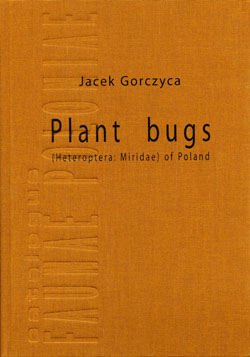 |
Jacek Gorczyca
Plant bugs (Heteroptera: Miridae) of Poland C A T A L O G U S Museum and Institute of Zoology 216 pages, hardcover, ISBN 978-83-918040-4-9 ISSN 1895-5614 Publisher: Natura Optima dux Foundation |
Cena: 60 PLN + przesyłka
Zamówienia:
Prosimy o skorzystanie z formularza zamówień lub kontakt z Biblioteką (Sprzedaż wydawnictw)
Abstract
The catalogue contains 162 species of mirid subfamilies Isometopinae, Deraeocorinae, Bryocorinae, Orthotylinae and Phylinae reported from Poland. All published data are provided, from the oldest WEIGEL’s report to the last faunistic papers. Unpublished data are also included. The current taxonomical status, distribution, biology and ecology of species as well as their economic importance are provided. A key to all the subfamilies which occur in Europe is given as well as keys to the tribes and genera of the subfamilies under discussion. The classification system follows the series of the Catalogue of the Heteroptera of the Palaearctic Region.
Key words: Bryocorinae, Deraeocorinae, Heteroptera, Isometopinae, Orthotylinae, Phylinae, Poland.
Catalogus Faunae Poloniae - New series - vol. 1 - Eriohyoid mites of Poland
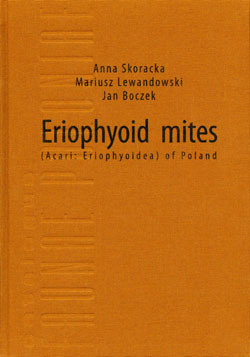 |
Anna Skoracka, Mariusz Lewandowski, Jan Boczek A catalogue of eriophyoid mites C A T A L O G U S Museum and Institute of Zoology 199 pages, hardcover, ISBN 83-918040-2-X Publisher: Natura Optima dux Foundation |
Cena: 38 zł + wysyłka
Zamówienia:
Prosimy o skorzystanie z formularza zamówień lub kontakt z Biblioteką (Sprzedaż wydawnictw)
Abstract
The catalogue contains 342 species of eriophyoid mites recorded in Poland. The aim of this report is to provide data on species occurrence in Poland, their current taxonomical status, world distribution, host plants infested, relation to the host plant and pest status. The catalogue is also a source of information on ecological, biological or applied observations made in Poland up to know. Identification keys to families, subfamilies, tribes and genera are also provided. The paper is based on all bibliographical data regarding the presence of eriophyoid mites in Poland. The classification system is followed by Amrine et al. (2003). The taxonomical verification was made according to Amrine & Stasny (1994), Amrine et al. (2003), de Lillo & Amrine (2005).
Key words: Acari, Diptilomiopidae, Eriophyidae, Eriophyoidea, Phytoptidae, Poland, host plants.
Fauna Polski - Nowa seria - vol. 3 - Ptyctimous mites of Poland
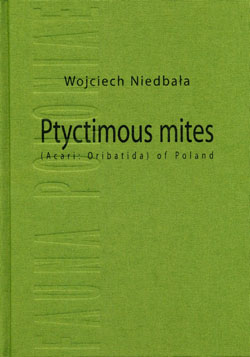 |
Wojciech Niedbała Ptyctimous mites (Acari, Oribatida) of Poland Museum and Institute of Zoology of the Polish Academy of Sciences Warszawa 2008 ca 173 x 243 mm, 242 pages, 42 plates, 35 tables, hardcover ISBN 978-83-918040-6-3 |
Cena: 55 zł + koszt przesyłki
Orders:
Please contact our orders department, or use online form (secure HTTPS connection)
A monograph of the ptyctimous mites (Acari, Oribatida) of Poland, typical xylophagous soil mites, has been prepared on the basis of 22 654 individuals found in 869 samples. A detailed analysis of morphology of representatives of ptychoid groups has been provided. The species occurring in Poland have been classified into two cohorts of Arthroptyctima and Euptyctima, two superfamilies Phthiracaroidea and Euphthiracaroidea, 5 families: Mesoplophoridae, Oribotritiidae, Euphthiracaridae, Phthiracaridae and Steganacaridae, and 12 genera. Diagnoses of higher taxa have been followed by a review of the species. At present the number of species known from Poland is 40. Compared to the previous studies, the number of species known from Poland was enriched by 20, including six species new to the science. Each species is illustrated and characteristics of morphology as well as metric data are provided; synonyms are listed under specific names. Keys for identification of the species and higher taxa are given.
Key words: Acari, Oribatida, ptyctimous mites, systematic, ecology, Poland
Katalog Fauny Polski
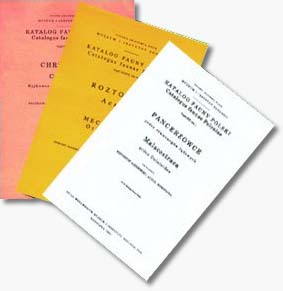
Volumes:
| Nr | Rok | Autor | Tytuł, (Część, zeszyt), strony | Cena zł |
| 1 | 1960 | Rafalski J. | Kosarze - Opiliones. (Cz.32, zesz.2), 28 pp. | 6,00 |
| 2 | 1962 | Moszczyńska M. | Skąposzczety- Oligochaeta. (Cz.11,zesz.2), 68 pp. | 10,00 |
| 3 | 1964 | Skuratowicz W. | Pchły - Aphaniptera. (Cz.31), 59 pp. | 8,00 |
| 4 | 1964 | Stach J. | Owady bezskrzydłe - Apterygota.(Cz.15), 103 pp. | 10,00 |
| 5 | 1965 | Tomaszewski C. | Chruściki - Trichoptera. (Cz.28), 104 pp. | 10,00 |
| 6 | 1966 | Wagner Z. | Wszy - Anoplura. (Cz.19, zesz.2), 32 pp. | 6,00 |
| 7 | 1966 | Prost. M. | Monogenoidea. (Cz.4, zesz.1), 29 pp. | 6,00 |
| 8 | 1967 | Klimaszewski S.M. | Koliszki - Psyllodea. (Cz.21, zesz.2), 51 pp. | 7,00 |
| 9 | 1967 | Rafalski J. | Zaleszczotki -Pseudoscorpionidea. (Cz.32, zesz.1), 34 pp. | 6,00 |
| 10 | 1967 | Grabda J. | Widłonogi pasożytnicze i tarczenice - Copepoda parasitica et Branchiura. (Cz.12, zesz.5), 27 pp. | 6,00 |
| 11 | 1968 | Włodarczyk J. | Gryzki - Psocoptera. (Cz.18), 40 pp. | 7,00 |
| 12 | 1968 | Szelęgiewicz H. | Mszyce - Aphidoidea. (Cz.21, zesz.4), 316 pp. | 30,00 |
| 13 | 1968 | Pawłowski L.K. | Pijawki - Hirudinea. (Cz.11, zesz.3), 94 pp. | 12,00 |
| 14 | 1969 | Berger L., Jaskowska J., Młynarski M. | Płazy i Gady- Amphibia et Reptilia. (Cz.39), 73 pp. | 15,00 |
| 15 | 1970 | Różańska Z. | Szczecioszczęki - Chaetognatha, Szkarłupnie - Echinodermata, Żachwy - Ascidia, Ogonice -Appendicularia. (Cz.37, zesz.2), 23 pp. | 6,00 |
| 16 | 1971 | Prószyński J., Staręga W. | Pająki - Aranei. (Cz.33), 382 pp. | 35,00 |
| 17 | 1971 | Grabda J. | Kolcogłowy - Acanthocephala. (Cz.10), 40 pp. | 7,00 |
| 18 | 1971 | Burakowski B., Mroczkowski M., Stefańska J. | Chrząszcze - Coleoptera. Piśmiennictwo. (Cz.23, zesz.1), 183 pp. | 15,00 |
| 19 | 1972 | Bazan-Strzelecka H. | Wodopójki - Hydracarina. (Cz.34, zesz.8), 100 pp. | 12,00 |
| 20 | 1973 | Burakowski B., Mroczkowski M., Stefańska J. | Chrząszcze - Coleoptera. Biegaczowate - Carabidae, część 1. (Cz.23, zesz.2), 232 pp. |
25,00 |
| 21 | 1974 | Stojałowska W., Staręga W. | Krocionogi - Diplopoda. (Cz.14, zesz.2), 71 pp. | 10,00 |
| 22 | 1974 | Burakowski B., Mroczkowski M., Stefańska J. | Chrząszcze - Coleoptera. Biegaczowate - Carabidae, część 2. (Cz.23, zesz.3), 430 pp. |
nakład wyczerpany |
| 23 | 1975 | Pisarski B. | Mrówki - Formicoidea. (Pt.26, zesz.1), 83 pp. | 10,00 |
| 24 | 1975 | Rembiszewski M., Rolik H. | Krągłouste i ryby - Cyclostomataet Pisces. (Pt.38), 251 pp. | 10,00 |
| 25 | 1976 | Nast. J. | Piewiki - Auchenorrhyncha (Cicadodea). (Pt.21, fasc.1), 256 pp. | 15,00 |
| 26 | 1976 | Bazyluk W. | Karaczany i modliszki - Blattodeaet Mantodea. (Pt.17, fasc.1), 31 pp. | 6,00 |
| 27 | 1976 | Bazyluk W. | Skorki - Dermaptera. (Pt.17, fasc.3), 19 pp. | 6,00 |
| 28 | 1976 | Burakowski B., Mroczkowski M., Stafańska J | Chrząszcze - Coleoptera.Adephaga except Carabidae, Myxophaga, Polyphaga: Hydrophiloidea. (Pt.23, fasc.4). 307 pp. | 25,00 |
| 29 | 1978 | Burakowski B., Mroczkowski M., Stefańska J. | Chrząszcze - Coleoptera.Histeroidea et Staphylinoideaexcept Staphylinidae. (Pt.23, fasc.5), 356 pp. | 30,00 |
| 30 | 1979 | Burakowski B., Mroczkowski M., Stefańska J. | Chrząszcze - Coleoptera. Kusakowate - Staphylinidae, part 1. (Pt.23, fasc.6), 309 pp. | nakład wyczerpany |
| 31 | 1978 | Prószyńska M. | Wioślarki - Cladocera. (Pt.12, fasc.2), 116 pp. | 10,00 |
| 32 | 1979 | Szelęgiewicz H. | Mączliki - Aleyrododea. (Pt.21, fasc.3), 19 pp. | 6,00 |
| 33 | 1979 | Kierych E. | Galasówkowate - Cynipoidea. (Pt.26, fasc.2), 102 pp. | 10,00 |
| 34 | 1980 | Burakowski B., Mroczkowski M., Stefańska J. | Chrząszcze - Coleoptera. Kusakowate - Staphylinidae, part 2. (Pt.23, fasc.7), 271 pp. | 25,00 |
| 35 | 1980 | Banaszak J. | Złotolitki - Chrysididae. (Pt.26, fasc.1), 81 pp. | 10,00 |
| 36 | 1980 | Kaczmarek J. | Pareczniki - Chilopoda. (Pt.14, fasc.4), 42 pp. | 6,00 |
| 37 | 1981 | Burakowski B., Mroczkowski M., Stefańska J. | Chrząszcze - Coleoptera. Kusakowate - Staphylinidae, part 3: Aleocharinae. (Pt.23, fasc.8), 329 pp. |
25,00 |
| 38 | 1983 | Burakowski B., Mroczkowski M., Stefańska J. | Chrząszcze - Coleoptera.Scarabaeoidea, Dascilloidea, Byrrhoidea et Parnoidea. (Pt.23, fasc.9), 394 pp. |
nakład wyczerpany |
| 39 | 1985 | Kawecki Z. | Czerwce - Coccoidea. (Pt.21, fasc.5), 106 pp. | 10,00 |
| 40 | 1985 | Burakowski B., Mroczkowski M., Stefańska J. | Chrząszcze - Coleoptera.Buprestoidea, Elateroidea etCantharoidea. (Pt.23, fasc.10), 400 pp. |
nakład wyczerpany |
| 41 | 1985 | Drzycimski I. | Widłonogi denne - Copepoda Harpacticoida. (Pt.12, fasc.4), 44 pp. | 8,00 |
| 42 | 1986 | Burakowski B., Mroczkowski M., Stefańska J. | Chrząszcze - Coleoptera.Dermestoidea, Bostrichoidea, Cleroidea et Lymexyloidea.(Pt.23, fasc.11), 242 pp. |
30,00 |
| 43 | 1986 | Burakowski B., Mroczkowski M., Stefańska J. | Chrząszcze - Coleoptera.Cucujoidea, part 1. (Pt.23, fasc.12), 265 pp. |
30,00 |
| 44 | 1986 | Burakowski B., Mroczkowski M., Stefańska J. | Chrząszcze - Coleoptera.Cucujoidea, part 2. (Pt.23, fasc.12), 277 pp. |
30,00 |
| 45 | 1987 | Burakowski B., Mroczkowski M., Stefańska J. | Chrząszcze - Coleoptera.Cucujoidea, part 3. (Pt.23, fasc.14), 308 pp. |
30,00 |
| 46 | 1988 | Riedel A. | Ślimaki lądowe - Gastropodaterrestria. (Pt.36, fasc.1), 315 pp. |
30,00 |
| 47 | 1988 | Złotorzycka J., Modrzejewska M. | Wszoły - Mallophaga. (Pt.19, fasc.1), 222 pp. |
25,00 |
| 48 | 1990 | Burakowski B., Mroczkowski M., Stefańska J. | Chrząszcze - Coleoptera.Cerambycidae et Bruchidae. (Pt.23, fasc.15), 311 pp. |
nakład wyczerpany |
| 49 | 1990 | Burakowski B., Mroczkowski M., Stefańska J. | Chrząszcze - Coleoptera. Stonkowate - Chrysomelidae, part 1. (Pt.23, fasc.16), 279 pp. |
40,00 |
| 50 | 1991 | Burakowski B., Mroczkowski M., Stefańska J. | Chrząszcze - Coleoptera. Stonkowate - Chrysomelidae, part 2. (Pt.23, fasc.17), 226 pp. | 20,00 |
| 51 | 1992 | Burakowski B., Mroczkowski M., Stefańska J. | Chrząszcze - Coleoptera. Ryjkowcowate procz ryjkowcow -Curculionoidea exceptCurculionidae. (Pt.23, fasc.18), 323 pp. | 25,00 |
| 52 | 1993 | Burakowski B., Mroczkowski M., Stefańska J. | Chrząszcze - Coleoptera. Ryjkowce - Curculionidae, part 1. (Pt.23, fasc.19), 304 pp. | 25,00 |
| 53 | 1995 | Jażdżewski K., Konopacka A. | Pancerzowce prócz równonogów lądowych - Malacostrata exceptOniscoidea. (Pt.13, fasc.1), 165 pp. | 18,00 |
| 54 | 1995 | Burakowski B., Mroczkowski M., Stefańska J. | Chrząszcze - Coleoptera. Ryjkowce - Curculionidae, part 2. (Pt.23, fasc.20), 310 pp. | 25,00 |
| 55 | 1996 | Olszanowski Z., Rajski A., Niedbała W. | Roztocza - Acari. Mechowce -Oribatida. (Pt.34, fasc.9), 242 pp. | 18,00 |
| 56 | 1997 | Burakowski B., Mroczkowski M., Stefańska J. | Chrząszcze - Coleoptera. Ryjkowce - Curculionidae, part 3. (Pt.23, fasc.21), 307 pp. | 25,00 |
| 57 | 2000 | Burakowski B., Mroczkowski M., Stefańska J. | Chrząszcze - Coleoptera. Uzupełnienia tomów 2-21. (Pt.23, fasc.22), 252 pp. | 25,00 |
| 58 | 2000 | Bazyluk W., Liana A. | Prostoskrzydłe - Orthoptera. (Pt.17, fasc.2),156 pp. | 23,00 |
| 59 | 2002 | Fiałkowski W., Kittel W. | Widelnice - Plecoptera. (Pt.16, fasc.3), 72 pp. | 10,00 |
| 60 | 2007 | Mroczkowski M., Kadej M. | Chrząszcze - Coleoptera.Piśmiennictwo (Pt.23, fasc.23), 660 pp. | 68,00 |
Fauna Polski - Nowa seria - vol. 2 - Middle and late Pleistocene
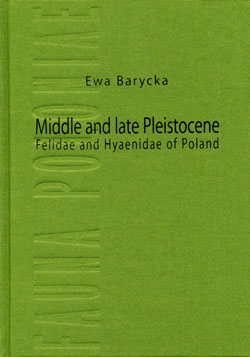 |
Ewa Barycka Middle and late Pleistocene Felidae and Hyaenidae of Poland Fauna Poloniae Vol.2 New series Museum and Institute of Zoology of the Polish Academy of Sciences and Natura optima dux Foundation. Warszawa 2008 ca 173 x 243 mm, 228 pages, 101 figures, 59 tables, hardcover ISBN 978-83-918040-5-6 |
Cena: 54 zł + koszt przesyłki
Orders:
Please contact our orders department , or use online form (secure HTTPS connection)
A revision of middle and late Pleistocene feliform carnivoran remains from the caves in the vicinity of Cracow proved the presence of Crocuta crocuta spelaea, Felis silvestris and Panthera spelaea spelaea and, for the first time, Panthera spelaea fossilis, thus enriching the list of big cats in Polish middle Pleistocene fauna. No Lynx remains were found. Analyses of Crocuta crocuta’s teeth brought about the revision of cave hyaena stratigraphy. Correlations between migration events and the size and shape of teeth were recognized. Different limb proportions are regarded as leading to a reduction of cursoriality but an increase in endurance and stability while carrying large pieces of carcass. Detailed evolutionary changes were determined in cave lion evolution. Additional diagnostic differences were recognized for Panthera spelaea. Mass and sexual dimorphism of cave lion were estimated. A marked narrowing of the lower incisors region and different proportion of limb bones were found. When compared to modern European wildcats, wildcat remains reveal intermediate characteristics between Felis silvestris silvestris and Felis silvestris tatressia.
Key words: Carnivora, Panthera spelaea, Crocuta spelaea, systematics, morphology, Europe
The Ants (Hymenoptera, Formicidae) of Poland
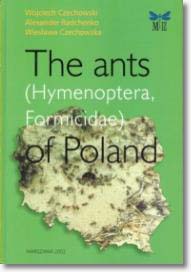 |
by Wojciech Czechowski, Alexander Radchenko and Wiesława Czechowska The Ants (Hymenoptera, Formicidae)of Poland is a monographic study of 98 ant species known from Poland. The book comprises three sections. The first is a catalogue of the Polish ants which provides a systematic review of the species together with information about their geographical ranges, occurrence in Poland and biology. This section cites all faunistic literature data up to the year 2000. The second section characterises the myrmecofauna of Poland, including its species, zoogeographical and ecological compositions. The third section consists of keys for identification of the Polish ant taxa.The book contains 200 pages, 6 tables, 101 figures (maps of ranges and distribution of species) and 20 plates of morphological drawings. Hard cover.The authors are members of the Department of Social Insects and Myrmecophiles of the Museum and Institute of Zoology of the Polish Academy of Sciences in Warsaw. |
The book is out of print.
Fauna Polski - Nowa seria - vol.1 - Trombidiidae of Poland
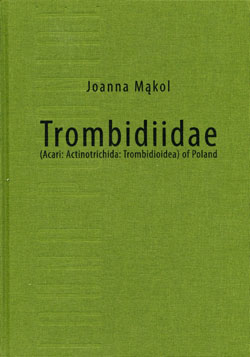 |
Joanna Mąkol Trombidiidae(Acari: Actinotrichida: Trombidioidea) of PolandFA U N A Museum and Institute of Zoology 39 tables with morphometric data, hardcover ISBN 83-918040-1-1 |
Cena: 48 zł + koszt przesyłki
Orders:
Please contact our orders department , or use online form (secure HTTPS connection)
Abstract: Twenty seven species of Trombidiidae have been recorded from Poland. Nine of them are known from larvae and postlarval instars, fourteen – exclusively from postlarval forms, four – only from larvae. Descriptions are provided with figures, distribution maps and tabulated metric characters. The following new synonyms are proposed: Sericothrombium brevimanum Berlese, 1910 (= Trombidium rowmundi Haitlinger, 1996), Acarus holosericeus L. (= Trombidium poriceps Oudemans, 1904), Trombidium rimosum C. L. Koch, 1837 (= Trombidium meyeri Krausse, 1916), Trombidium megalochirum Berlese, 1910 (= Dinothrombium rubropurpureum Oudemans, 1914), Trombidium filipes C. L. Koch, 1837 (= Podothrombium magnum Berlese, 1910, = Podothrombium proti Haitlinger, 1994, = Podothrombium roari Haitlinger, 2000), Podothrombium kordulae Haitlinger, 1995 (= Podothrombium rigobertae Haitlinger, 1995), Podothrombium verae Haitlinger, 1995 (= Podothrombium tersonderi Haitlinger, 1995). Neotypes are designated for Trombidium rimosum C. L. Koch, 1837, Trombidium fuliginosum Hermann, 1804, Trombidium molliculum C. L. Koch, 1837 and Trombidium bicolor Hermann, 1804, whereas lectotypes – for Allothrombium wolmari Haitlinger, 2000, Podothrombium macrocarpum Berlese, 1910 and Podothrombium strandi Berlese, 1910. Sericothrombium carpaticum Feider, 1950, Trombidium fuornum Schweizer, 1951 and Trombidium susteri Feider, 1956 are treated as doubtful taxa. The specific status of Allothrombium lechi Haitlinger, 1996 (syn. of Trombidium fuliginosum Hermann, 1804 [?]) and Podothrombium dariae Haitlinger, 1995 is also regarded as doubtful because of insufficiently indicated differentiating characters and the poor condition of type specimens, which do not allow a critical reappraisal of the types.
Trombidium latum C. L. Koch, 1837, Trombidium monticola sp. nov., Podothrombium macrocarpum Berlese, 1910, Podothrombium spinosum Feider, 1955 and Podo thrombium strandi Berlese, 1910 are new to the Polish fauna. Allothrombium meridio nale Berlese, 1910 and Allothrombium pergrande Berlese, 1903 should be excluded from the checklist of trombidiids of Poland due to misidentifications confirmed after studies of the type material in the Berlese Acaroteca.
Key words: Acari, Trombidiidae, taxonomy, new species, new synonyms, Poland.
Fauna Polski - Nowa seria - vol. 5 - The structure and distribution of parasite assemblages of roach (Rutilus rutilus L.)
|
|
Marcin Popiołek The structure and distribution of parasite assemblages of roach (Rutilus rutilus L.)
Museum and Institute of Zoology of the Polish Academy of Sciences Warszawa 2012 175 x 245 mm, 295 pages, twarda okładka, ISBN 978-83-930773-6-6 ISSN 0303-4909 |
Price: 60 euro + 5% VAT + postage
Orders:
Please contact our orders department Ten adres pocztowy jest chroniony przed spamowaniem. Aby go zobaczyć, konieczne jest włączenie w przeglądarce obsługi JavaScript., or use online form (secure HTTPS connection)
Celem badań było wykazanie wielokierunkowego wpływu czynników środowiskowych (naturalnych i antropogennych) na rozmieszczenie oraz strukturę zgrupowań pasożytów płoci (Rutilus rutilus L.) wzdłuż biegu Odry. Analizowane czynniki podzielono na dwie grupy. Do czynników środowiskowych zaliczono: (1) charakter rzeki, (2) poziom uprzemysłowienia terenów przy-ległych, (3) obecność lub brak sztucznych przegród w korycie rzeki, (4) obecność lub brak gospodarstw rybackich, (5) bogactwo ostoi ptaków wodno-błotnych w sąsiedztwie rzeki oraz (5) szybkość nurtu. Wśród czynników fizyko-chemicznych wyróżniono grupy parametrów charakteryzujących: (1) warunki fizyczne i termiczne wody, (2) warunki tlenowe i zanieczyszczenia organiczne, (3) zasolenie, (4) zakwaszenie oraz (5) warunki biogenne. Na siedmiu stanowiskach zlokalizowanych wzdłuż całego, mierzącego 854 km, biegu Odry odłowiono łącznie 451 płoci, które poddano pełnym sekcjom parazytologicznym.
Słowa kluczowe: Pasożyty, Rutilus rutilus, płoć, Odra, zgrupowania pasożytów, czynniki środowiskowe, Polska.
Fauna Polski (Fauna Poloniae)

The Fauna Polski series provides synthetic review of particular animal families occurring in Poland. Each volume represents, at the time of its publication, the state of art in our knowledge concerning morphology, zoogeography, and bionomy of animals studied. It also contains detailed information about collecting methods, identification keys (in some cases also in English), systematic index, and is rich in illustrations of diagnostic characters, and relevant bibliography.
| Tom | Autorzy | Tytuł, rok wydania, strony |
Cena |
| 1 |
J. D. Plisko |
Lumbricidae - Dżdżownice (Annelida: Oligochaeta), 1973, 156 pp. |
12 zł |
| 2 |
A. Riedel and A. Wiktor |
Arionacea - Ślimaki krążkowate i ślinikowate (Gastropoda: Stylommatophora), 1974, 140 pp. |
20 zł |
| 3 |
S. M. Klimaszewski |
Psyllodea - Koliszki (Insecta: Homoptera), 1975, 295 pp. |
20 zł |
| 4 |
M. Mroczkowski |
Dermestidae - Skórnikowate (Insecta: Coleoptera), 1975, 163 pp. |
Nakład wyczerpany |
| 5 |
W. Staręga |
Opiliones - Kosarze (Arachnoidea), 1976, 197 pp. |
40 zł |
| 6 |
W. Bazyluk |
Blattodea et Mantodea - Karaczany i modliszki (Insecta), 1977, 173 pp. |
Nakład wyczerpany |
| 7 |
R. Bańkowska |
Conopidae - Wyślepki (Insecta: Diptera), , 1979, 134 pp. |
25 zł |
| 8 |
P. Trojan |
Tabanidae - Ślepaki (Insecta: Diptera), 1979, 309 pp. |
50 zł |
| 9 |
S. Mazur |
Histeridae - Gnilikowate (Insecta: Coleoptera), 1981, 207 pp. |
25 zł |
| 10 |
A. Warchałowski |
Chrysomelidae - Stonkowate (Insecta: Coleoptera). Part I, 1985, 273 pp. |
Nakład wyczerpany |
| 11 |
L. Borowiec |
Bruchidae - Strąkowce (Insecta: Coleoptera), 1988, 226 pp. |
Nakład wyczerpany |
| 12 |
A. Wiktor |
Limacoidea et Zonitoidea nuda - Ślimaki pomrowiokształtne (Gastropoda: Stylommatophora), 1989, 207 pp. |
Nakład wyczerpany |
| 13 |
A. Warchałowski |
Chrysomelidae - Stonkowate (Insecta: Coleoptera). Part II, 1991, 347 pp. |
40 zł |
| 14 |
S. Niesiołowski |
Empididae aquatica - Wodne wujkowate (Insecta: Diptera). 1992, 128 pp. |
12 zł |
| 15 |
A. Warchałowski |
Chrysomelidae - Stonkowate (Insecta: Coleoptera). Part III, 1993, 279 pp. |
40 zł |
| 16 |
A. Warchałowski |
Chrysomelidae - Stonkowate (Insecta: Coleoptera). Part IV, 1994, 302 pp. |
40 zł |
| 17 |
A. Warchałowski |
Chrysomelidae - Stonkowate (Insecta: Coleoptera). Part V, 1995, 360 pp. |
40 zł |
| 18 |
L. Borowiec |
Mordellidae - Miastkowate (Insecta: Coleoptera). 1996, 191 pp. |
Nakład wyczerpany |
| 19 |
M. Żabka |
Salticidae - Pająki skaczące (Arachnida: Aranea). 1997, 188 pp. |
40 zł |
| 20 |
A. Warchałowski |
Chrysomelidae - Stonkowate (Insecta: Coleoptera). Part VI, 1998, 292 pp. |
40 zł |
| 21 |
D. Tarnawski |
Elateridae - Sprężykowate (Insecta: Coleoptera). Part I, 2000, 415 pp. Incl. 691 figs., keys in both English and Polish, 30 pp. of cited literature. Hard cover. |
40 zł |
| 22 |
A. Warchałowski |
Chrysomelidae - Stonkowate (Insecta: Coleoptera). Part VII, 2000, 359 pp. Incl. supplement to parts I-VI, 345 figs., 144 pp. of cited literature. Hard cover. |
40 zł |
| 23 |
Agnieszka Draber-Mońko |
Calliphoridae - Plujki (Insecta: Diptera). 2004, 658 pp. Hard cover. |
60 zł
|
Fauna Polski - Nowa seria - vol. 4 - The ants of Poland with reference to the myrmecofauna of Europe
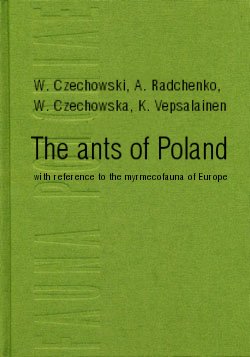 |
Wojciech Czechowski, Alexander Radchenko, Wiesława Czechowska, Kari Vepsäläinen The ants of Poland with reference to the myrmecofauna of Europe
Museum and Institute of Zoology of the Polish Academy of Sciences Warszawa 2012 173 x 243 mm, hardcover, 496 pages, 201 maps, 55 plates with several hundred SEM photographs of morphological details, 33 figures with drawings, 13 tables. ISBN 978-83-930773-4-2 |
Price: 95 € + 5% VAT + postage
Special Offer (save up to 70%)
Orders:
Please contact our orders department Ten adres pocztowy jest chroniony przed spamowaniem. Aby go zobaczyć, konieczne jest włączenie w przeglądarce obsługi JavaScript., or use online form (secure HTTPS connection)
This book on ants (Hymenoptera: Formicidae) is an updated, corrected and expanded version of the previous monograph of the Polish myrmecofauna (Czechowski et al. 2002). It contains 103 ant species of 25 genera reported in Poland until 2010, the occurrence of which in the country are unquestionable or at least considered by the authors probable. The book consists of four main chapters: (1) a systematic checklist of the ant taxa (subfamilies, genera, species) of Europe, (2) a faunistic catalogue of the ants of Poland, (3) characteristics of the myrmecofauna of Poland, and (4) keys for identification. The checklist is the newest updated list of the European ants, and it displays recent alterations in the ant taxonomy. It contains nine subfamilies, 57 genera and 613 valid species; the list is complemented by 10 recognised but not yet formally described species. The faunistic catalogue provides a taxonomic survey of the Polish ant species together with information about their general distribution in the Palaearctic and the distribution in Poland, with notes on the biology of each species. For some taxa (species, genera), notes on their taxonomic history are provided. The chapter compiles all faunistic data published until the end of the year 2010; published reports are supplemented by confirmed unpublished data available to the authors. For every species maps of their ranges in the Palaearctic and distributions in the geographical regions in Poland are enclosed. The catalogue is closed by a list of the species ever reported in Poland and later owing to a specified reason excluded from the Polish fauna. The next chapter includes zoogeographical and ecological characteristics of the Polish myrmecofauna, with reference to the European myrmecofauna as a whole. The last chapter includes keys for identification of the ant taxa (subfamilies, genera and species), individually for workers, queens and males (when distinguishable). The keys for subfamilies and genera involve all European taxa of these ranks. The keys for species include all ant species known in Poland, and those not reported from Poland but present in adjacent regions of Central Europe, and recognised as possible to be found in the country. The keys are illustrated with SEM photographs. The main chapters are preceded by the foreword presenting general trends in myrmecological research in the world throughout history, and the introduction, in which the past and the present of Polish myrmecology is outlined.
Key words: Ants, biology, checklist, ecology, Europe, faunistics, key, morphology, Poland, systematics, taxonomy, zoogeography.
Coleoptera Poloniae: Tenebrionoidea (Tetratomidae, Melandryidae, Ripiphoridae, Prostomidae, Oedemeridae, Mycteridae, Pythidae, Aderidae, Scraptiidae)
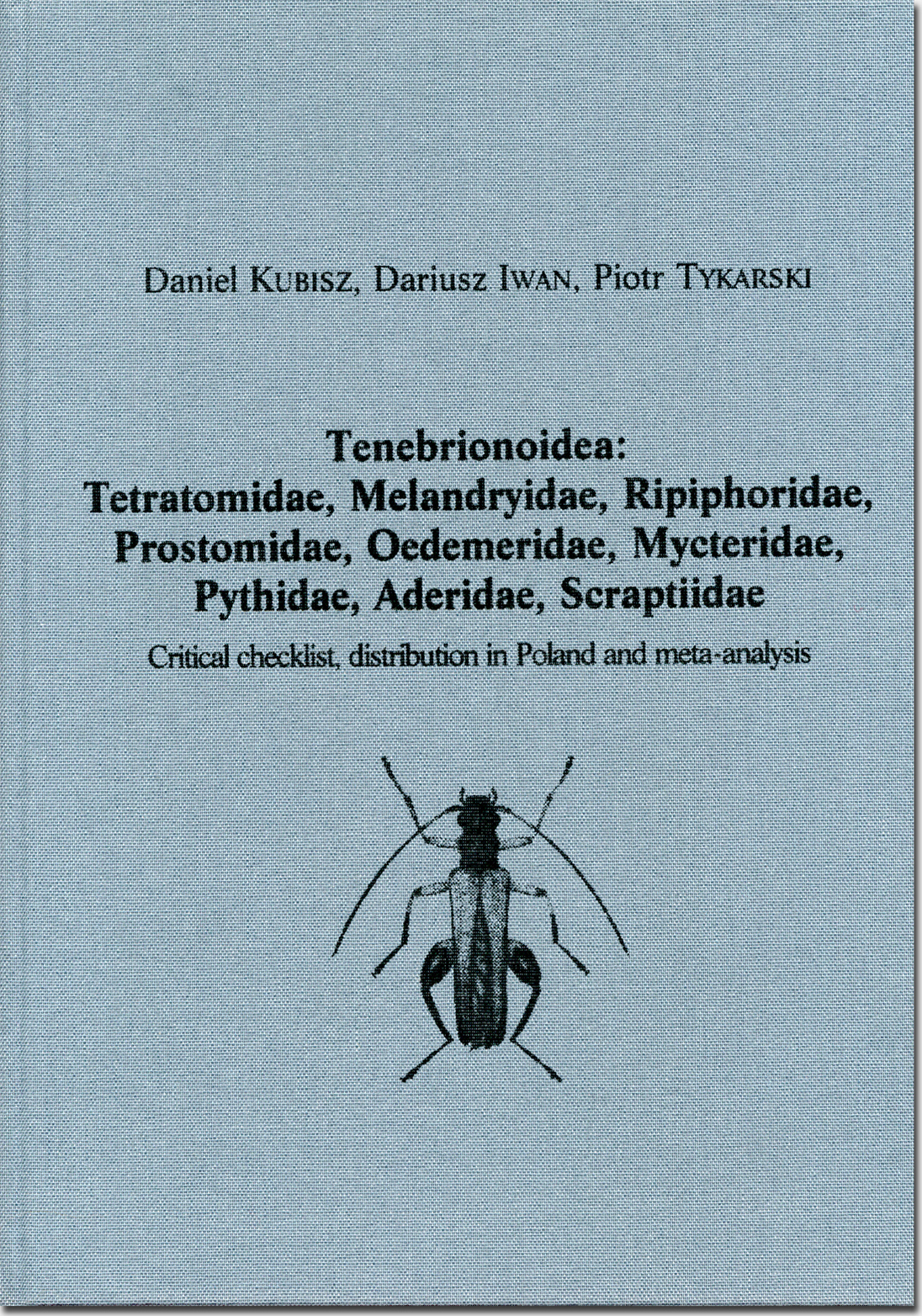 |
Critical checklist, distribution in Poland and meta-analysis Kubisz D., Iwan D., Tykarski P. 2014. Coleoptera Poloniae: Tenebrionoidea (Tetratomidae, Melandryidae, Ripiphoridae, Prostomidae, Oedemeridae, Mycteridae, Pythidae, Aderidae, Scraptiidae). University of Warsaw – Faculty of Biology, Hardcover, 176 x 250 mm, 470 pages, 209 figures, maps ISBN 978-83-935107-9-5 Price: 75 euro + 5% VAT + postage orders: Please contact Ten adres pocztowy jest chroniony przed spamowaniem. Aby go zobaczyć, konieczne jest włączenie w przeglądarce obsługi JavaScript. |
Abstract
The book catalogues distribution data on occurrence of families of Tenebrionoidea. Having reviewed available distribution data, we consider 84 species to be present in Poland: Aderidae (7 species), Melandryidae (27), Oedemeridae (22), Prostomidae (1), Pythidae (3), Ripiphoridae (3), Scraptiidae (15) and Tetratomidae (6). 27 species were considered doubtful due to misindentifications or a long-term lack of new occurrences, including Mycteridae. Data on distribution of the confirmed taxa cover source references, localities, UTM 10×10 km grid coordinates, dates and collections that hold specimen, accompanied by distribution maps generalized to the UTM grid. A separate chapter gives an overview of Palaearctic distribution of all the discussed taxa, including subspecies when applicable. Detailed taxonomic checklist of the covered groups including synonymy is also provided. The distribution catalogue part is followed by the meta-analysis built upon a database covering all the presented information. A number of analytical and generalization techniques was used, giving synthetic views on research intensity and some other parameters at a species and family level. The publication follows the former volume of the Coleoptera Poloniae series, extending traditional faunistics by links to the database that is available online through the Biodiversity Map and Coleoptera Poloniae websites, served by the Polish Biodiversity Information Network (KSIB).
Key words
Coleoptera, Tenebrionoidea, Tetratomidae, Melandryidae, Ripiphoridae, Prostomidae, Oedemeridae, Mycteridae, Pythidae, Aderidae, Scraptiidae, biodiversity, faunistics, zoogeography, distribution, meta-analysis, checklist, museum collections, Poland.
Strona 3 z 6




